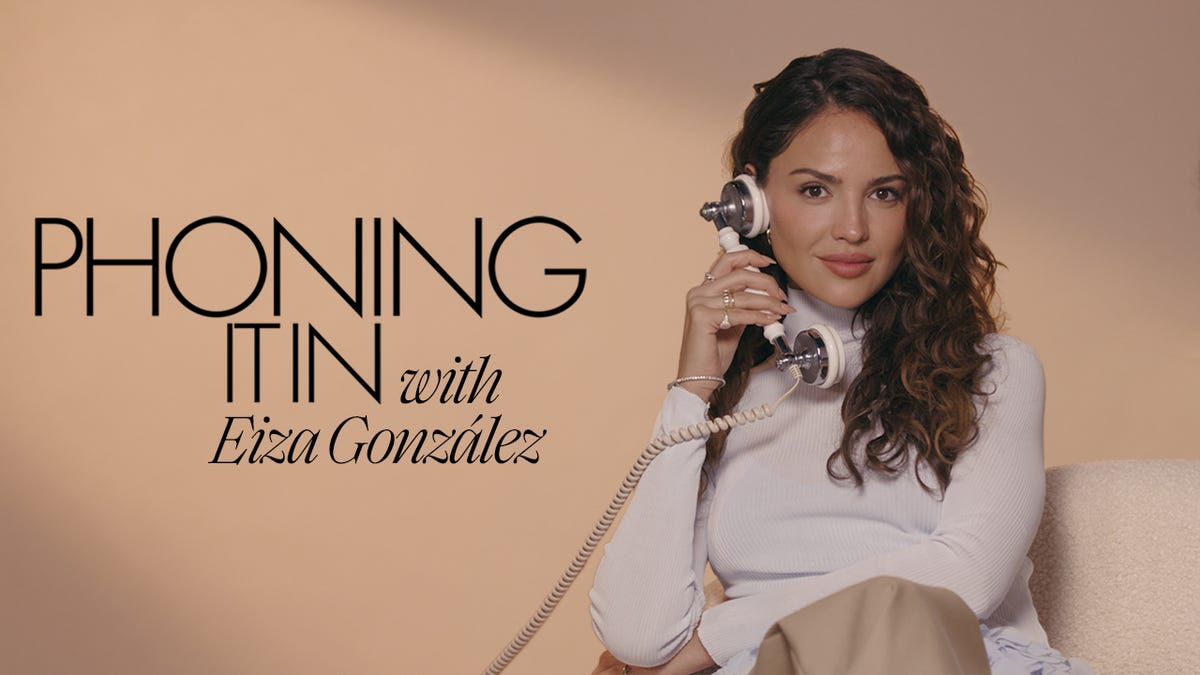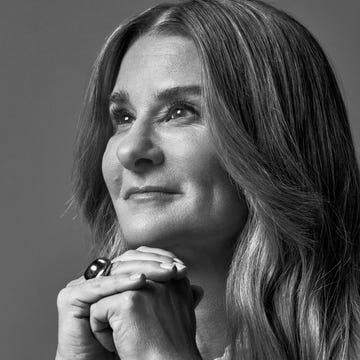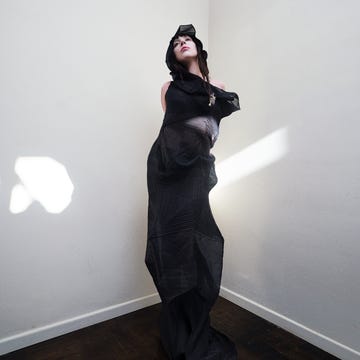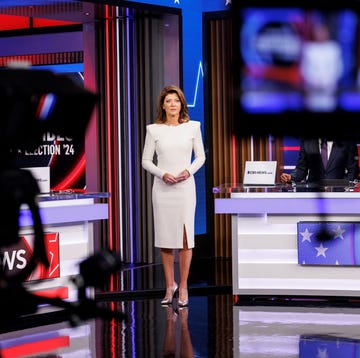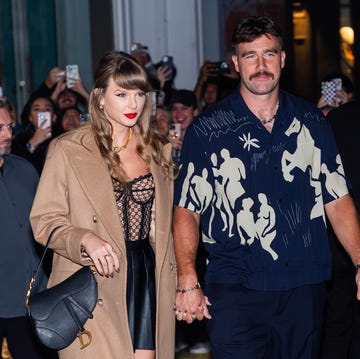I mean… I can't. I just literally can't. I feel like, you know, it is just too. It is just too too. I can't.
Never in the history of language have we said so little, with so many words.
A satiric video recently hit Gawker in which a comedian calls 911 because his girlfriend is "literally dying" over Beyoncé's visual album. She "just can't." She "just can't even." She proceeds through various figures of common girl speak—an "omigod stoppit," a "gettit" and a prolonged "Yasssssss."
The video would have been funnier if it didn't hit so close to home. How we speak in the privacy of our own homes is one thing. I am the first to admit that I indulge in an embarrassing form of coded secret language baby talk with my significant other that would make you "literally" cry if you heard it. The problem as I see it is that this new way of girl speak has trickled into the professional lives of women between the ages of 20 and 40 in a way that is actually holding women back in the workplace.
Related: The Curious Double Standard of Google Glass
"When I interview young women, typically juniors and seniors in college, to work at FinePoint, I notice that girl speak manifests itself in a casualness that shouldn't be there," Meredith Fineman, the 27-year old founder of FinePoint PR told me. "I'm also a younger woman—if this is damaging my perception of them I can only imagine how it would affect someone not in their demographic."
Fineman has wondered what about her makes these young women think they can talk to her like a girlfriend. Her company may be a start-up, but she is still the boss and she is still interviewing them for a job.
On several occasions she has had to gently pull a young woman aside to express her concerns and let her know that she should probably start over again.
There have been too many occasions to count when I have been in the middle of a professional phone conversation where, during the obligatory small talk portion of our phone call, the phrases "I can't" and "I mean" in quick succession for five minutes straight. Did I take these women seriously? No. Not at all. Did I want to work with them in the future? Not even a little bit.
Related: Dear Hannah Horvath, Don't Go To Grad School
"Fairly or unfairly, it causes me to discount the young woman's work, question whether she is able to perform and grow and most importantly, question whether she has the maturity and presence to be an appropriate, focused representative of our company who will be taken seriously," Kathleen Warner the founding Chief Operating Officer of the Startup America Partnership, who currently advises established corporations, not-for-profits and startups on innovation and strategic growth told me recently when we were discussing this phenomenon.
Warner describes these figures of speech as "unprofessional," "immature," and even clueless.
"When working with or interviewing a young woman, uptalk, baby or little girl voices and constant hair twirling and stroking are not only frustrating and distracting, but areas of concern." (For more on uptalk or upspeak or the "high rising terminal"—that tendancy some women have to raise the tone at the end of a declarative sentence, head here and here.)
Warner told me that she consistently hears young women express concern that they are not being taken seriously, given responsibility or promoted as quickly as they would like. She worries that how they are presenting themselves is contributing to that.
"If that's happening, my question back is around the why and whether they are speaking and acting is moving them forward or holding them back," Warner said.
LinkedIn's career expert Nicole Williams once had to ask her 28 year old nanny what "totes" meant.
She just keeps hearing more and more young women using that word and other pop culture buzz phrases in professional settings and she sees it as a hindrance—a big one.
Related: Why I Never Tell Anyone (Especially My Co-Workers) My Age
"It can be an enormous problem when it comes to being taken seriously and creating a professional brand," Williams told me. "It is important to know the specifics of this language to fit into corporate culture but unless you are working on a script for Girls or employed as Kim Kardashian's assistant they don't include 'I can't even'."
Williams frequently encounters women who claim to her that these kinds of phrases make them seem current and relevant. To those women she wants to deliver a large, "Oh no, it doesn't."
"Ladies, no. It impacts your professional credibility!" she told me with a bit of a start. "I think it's important for women to find other women who they admire and study their language. Follow LinkedIn influencers and read their posts. They aren't using unprofessional slang in order to express their professional thoughts."
Men seem to be held to a lower standard when it comes to colloquial speech. They are allowed a modicum of bro, bra, wazzup and fistbumping in a boardroom. They can have a "jam sesh" and "crush it." There is a double-standard between how a man is viewed for frat-speak and how a girl is viewed for whatever we want to call the female equivalent.
It may not be fair, but that doesn't mean the dumbing down of female speech is something we should let seep into the office.
Julie Sygiel has a "like jar" at her company Dear Kate that allows the team, including herself, to improve their communication.
"Anytime one of us uses the word "like" as a filler word, we have to put a coin in the jar. It's especially helpful when interns are in the office and without it we would all sound 19," the 26 year old founder of the revolutionary underwear startup explained to me. "In my opinion there's merit in choosing when you want to use language that's considered professional versus casual, however, I find it hard to switch back and forth, so I try habitually to never use filler words."
Sygiel tells me that she tries to take the time to correct her team members when they use words incorrectly or unprofessionally.
"I feel as though it reflects on our entire team if one of them makes the same mistake when speaking or emailing to others outside the company," she said. "Even if they take offense, it's in their best interest to know the correct use of a word."
Catie Lazarus is a comedian and the founder and producer of the hilarious Employee of the Month podcast. In the entertainment industry, you can often get away with much more casual language, still Lazarus longs for the women around her to use language properly.
Related: 10 Reasons You Didn't Get That Job
"I prefer people let me know that there is food in my teeth, and the same holds true for correcting my grammar, syntax, mispronunciation of a name or pop culture reference," Lazarus said. She finds that when young women (or men) revert to up-speak, sloppy syntax, or poor grammar, it's hard to take them seriously, even in comedy.
"The problem with up-speak, fillers such as um or like… is that it sets a tone, an annoying one. Pop your polo collars, use cliches, even sexist tropes, but leave the Valley Speak back at Camp Matoka where you picked it up."
At the end of the day this kind of casual language in the workplace is clearly a problem, a bigger one for women than it is for men, because we are often forced to hold ourselves to a higher standard. Is that fair? No. But for now, them's the breaks. Just because we are seeing more women rise to positions of power in the workplace, doesn't mean it is ok for any of us to speak like we are at a slumber party, or watching a Beyoncé video on repeat. The women who made it to the top of the corporate ladder didn't get there by literally dying.


